
SEASON 21 (1949-50)
The Little Dry Thorn
Othello
Christmas in the Marketplace & The Bear
Shadow and Substance
Paradise Street
The Gentle People
September 1949
THE LITTLE DRY THORN
by Gordon Daviot
Directed by Peter Curtis
Designed by Vivian Isenthal

The Old Testament Story of Abraham, Sara and Hagar by the playwright who also wrote Richard of Bordeaux, the play that had established John Gielgud in the early 1930s.
The director Peter Curtis writes in the programme:
"Our aim has been to present the play simply and sincerely, sacrificing as the playwright does the apparent realism for the deeper reality which arises from the sense of the close connection between the world of 2500 B.C. and to-day."
November 1949
OTHELLO
by William Shakespeare
Directed by Alfred Emmet
Designed by Graham Heywood
Our first Shakespeare production since Much Ado about Nothing in 1946
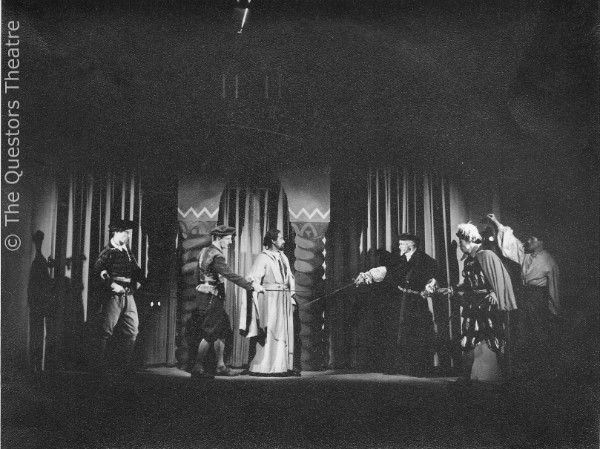
In a slightly ruffled exchange of memos about the budget for this show between Alfred and Lister Beck (Hon Treasurer), Alfred makes a plea for funding which may strike a chord with our wardrobe team today.
"I would suggest that too much comparison with past figures in recent years is not altogether appropriate as for one thing I suggest it has been not a little apparent that we have skimped money on costumes in recent times with a deleterious effect on the artistic standards."
Those who remember Wilf Sharp, who played Iago in this production, will not be surprised that when Alfred asked cast members if they had any problems with his proposed cuts to the text, it was like a red rag to a bull. Wilf's letter is difficult to read in some places but it is well worth a try! Here are some snippets:
"I can't for the life of me see why 'Othello' has to be cut to two and a half playing hours. I personally regard it as the finest play ever written for the stage...Agreed it is an intense play, but...I can but express my sorrow, anger and complete surprise at some of the excisions and butcherings you have perpetrated...'The Beaux' Stratagem' was pretty well murdered by Abraham [Asseo]."
Wilf was a lovely man but a formidable, if not pedantic, critic. I'm sure I'm not the only actor who remembers him sitting in the front row scribbling notes while I performed. I hope it's not cruel or unfair to note with some amusement that one of the press reviewers was puzzled by Wilf's performance as Iago and accused him of being melodramatic and out of tune with the rest of the production. Touché.
As we are moving into a new decade some old friends are beginning to appear in the cast lists. This production saw Doug Thomas's first appearance on our stage in the part of Gratiano.
January 1950
CHRISTMAS IN THE MARKET PLACE
by Henri Gheon, adapted by Eric Crozier
&
THE BEAR
by Anton Chekhov, translated by Constance Garnett
Directed by Abraham Asseo
Designed by Rosemary Jones & Nan Rowley
A "delightful and sensitive" French play with a Chekhov farce as a curtain raiser.
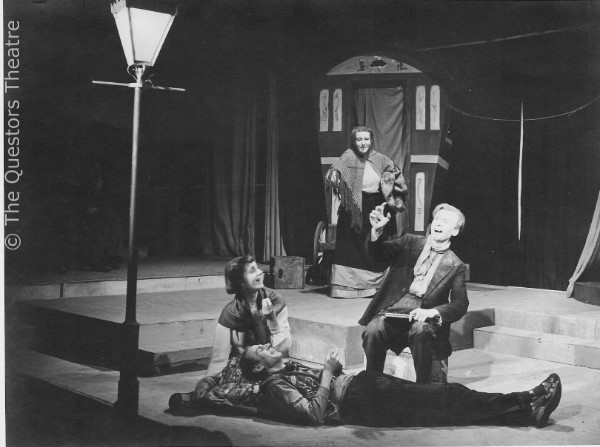
This double bill marked an early experiment in stage format. The players were on the floor of the auditorium and some of the audience were on the stage (see photo below). It was a rudimentary attempt at arena theatre which Alfred said did not teach us much except about the problems of sightlines.
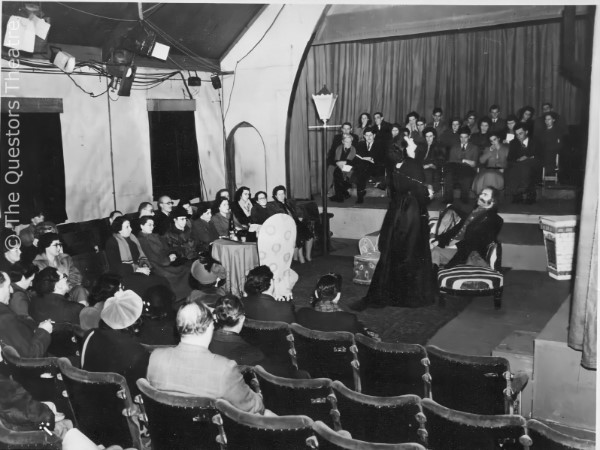
The context for this experiment was a talk Alfred had broadcast on the Third Programme a few months earlier and which was published in full in The Listener
February 1950
SHADOW AND SUBSTANCE
by Paul Vincent Carroll
Directed by Eric Voce
Designed by Marion Voce
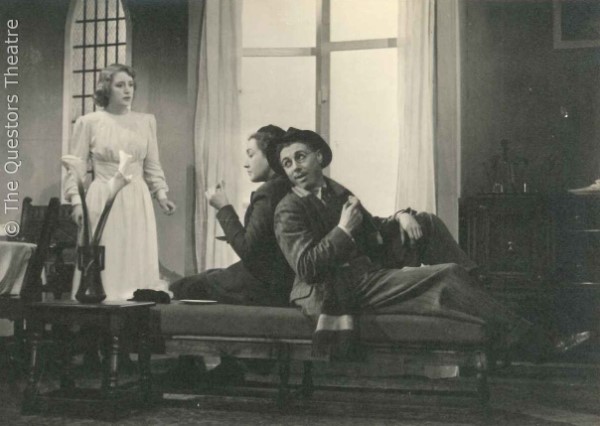
First produced at the Abbey Theatre in 1937 and transferring to Broadway in 1938, this Irish play explores the spiritual decline of the Catholic Church and contrasts it to the purity of faith practised by a young girl.
Nothing much else to say really!
March 1950
PARADISE STREET
By Antony Brown
Directed by Alfred Emmet
Designed by Beryl Anthony
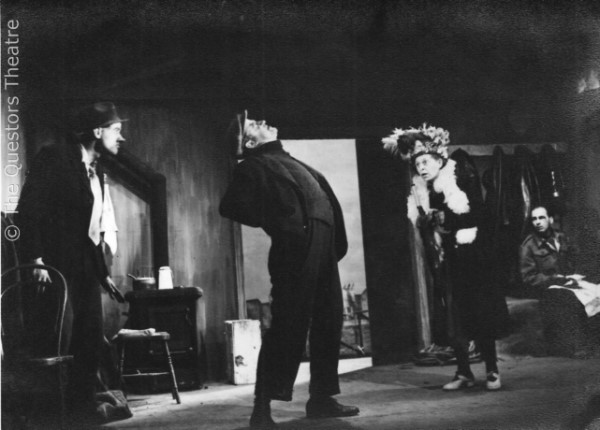
This was the first production of a new play, described as a "robust dockland farce" and which, according to one reviewer, had the audience "tutting" at the "savoury" language. There is also the suggestion that the actors were delivering the over-recurring adjective "bleeding" with evident self-consciousness.
It was, nonetheless, favourably reviewed in The Times, and The Stage was impressed by its vivid conveyance of "the misty atmosphere of London's dockside."
May 1950
THE GENTLE PEOPLE
by Irwin Shaw
Directed by Peter Curtis
Designed by Ernest Ives
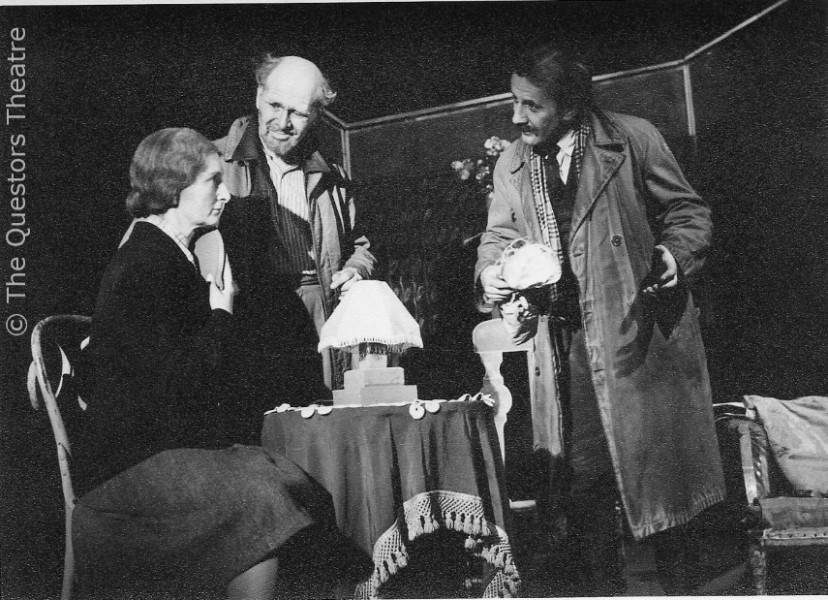
This play was written and produced in New York and London in 1939, just before the outbreak of the Second World War. When the BBC revived it in a radio broadcast in 1949, its simple story of two old men reflected very much the spirit and feelings of the post-war era.
" ... if you want peace and gentleness you got to take violence out of the hands of the people like Goff and you got to take it in your own hands and use it like a club. Then maybe on the other side of violence there will be peace and gentleness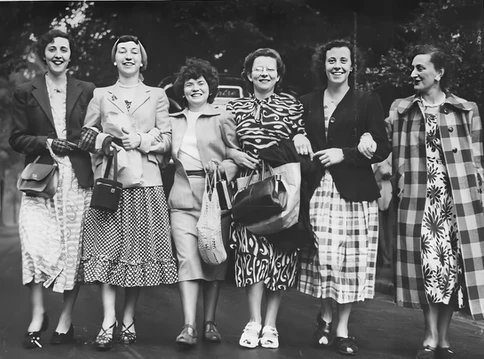 ."
."
This was Ted Scrivener's debut performance, in the part of Magruder.We were invited to take this production to the Palace Court Theatre in Bournemouth as part of a British Drama League conference.
Committee of Management minutes record that the motor coach was booked at the cost of £26. 5s. 0d for the return trip to Bournemouth, and it was agreed that "cast and stage staff be carried free of charge and that other passengers pay a return fair of £1."
By the looks of it a good day out was had by one and all!








 ."
."